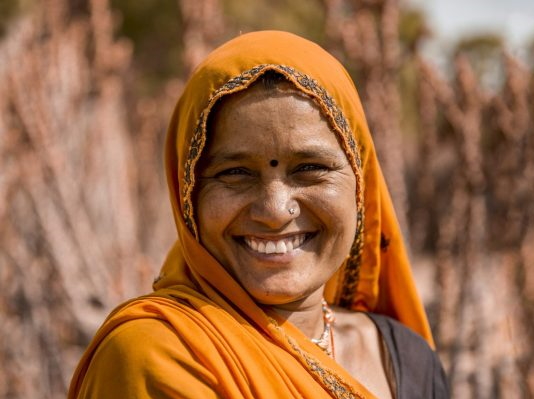Chanda’s Story
Chanda Kumawat is a 43-year old female farmer living in Morra Village with her husband, Badrilal Kumawat, and three children. She owns 1.75 ha of land, of which 0.5 ha is located in a different village with poor soil quality. Chanda has traditionally been the sole family member responsible for the planting, cultivation, and harvesting of her household’s agricultural plots, as her children were pursuing other career paths and/or academic degrees. Prior to July 2014, her husband migrated for about 10 months every year to Ahmedabad1 to work as a scrap dealer and laborer in a steel polishing factory.
When JIVA initiated its program in Morra in 2013, Chanda attended the community meetings and became a keen observer of JIVA’s resilient agriculture and accountable education activities. In May 2014, Chanda was selected as a sorghum demo plot farmer, and her sorghum yield increased by 17%2 due to her adoption of practices advised by JIVA.
When JIVA introduced its crop diversification initiative, Chanda encouraged her husband to enroll as a participant on a pomegranate exposure visit to Nasik.3 Following a positive experience, Chanda advocated for the allocation of 0.25 ha of her land to pomegranate. Chanda and her husband planted 150 pomegranates in July 20144 and an additional 80 plants on 0.125 ha the following year. During the dry season, due to the lack of continuous irrigation,5 Chanda convinced her brothers-in-law to install drip irrigation on her land from the well the family shared. The drip irrigation system is now used to irrigate the family’s pomegranate and cotton.

The Kumawat family is happy with the performance of the pomegranate plants’ growth, flowering, and taste. In July 2017, the family sold 350 kg of pomegranate to earn $900 in income, in addition to consuming and giving away some of their harvest to relatives and friends. These initial results are even more impressive considering that pomegranate yields are expected to at least quadruple over the next 2-3 years, leading up to the plants reaching full maturity. Chanda has taken steps to protect her family’s new high-value crop, re-investing nearly $600 to fence in her pomegranate field this past year.
“Chanda has also shared her learnings on vermi-composting and pomegranates with her uncle, who later began producing vermi-compost, has planted about 400 pomegranates in his fields in a village about 12 km from Morra.”
Chanda is now successfully producing and applying vermi-compost to her crops and fruit plants. After gaining confidence in JIVA by participating in the sorghum crop demo, she has adopted best practices for her wheat crop by using a seed drill to ensure proper line sowing. Her son, who runs a shop in the village and had never taken an interest in agriculture, now visits and helps maintain the pomegranate orchard. Chanda has shared her learnings with relatives outside the JIVA project area, and an uncle who lives in a village 7 miles from Morra now produces vermi-compost and has planted 400 pomegranates. Chanda’s willingness to adopt best agricultural practices have transformed her farm into a model for the community, and her fields are featured by JIVA staff during intra-JIVA exposure visits.6

In addition to agriculture, Chanda has taken an interest in JIVA’s initiative to improve the quality of education in the villages. She attends the majority of JIVA’s education meetings and was elected as a Vice-Chairperson of the School Management Committee (SMC). Chanda regularly visits the school and participates in all SMC meetings. Chanda cannot stop smiling while she says that her husband has all but ended his migration to Ahmedabad since July 2014, having traveled for just two months over the past year.
1 The largest city in the state of Gujarat, over 200 miles southwest of Morra.
2 Compared to the control plot.
3 An ancient holy city in the state of Maharashtra, 450 miles south of Morra.
4 Though 40 plants died, they were replaced with new seedlings in February 2015.
5 As electricity for irrigation was mainly at night.
6 An “intra-JIVA” exposure visit is when JIVA farmers travel to another JIVA farm to see and understand the successful pomegranate and intercropping practices of a farmer within the project area. Whereas exposure visits were initially external to the JIVA project area, the first intra-project exposure visit occurred in December 2015 as JIVA farmers adopted best practices and became model farmers.

